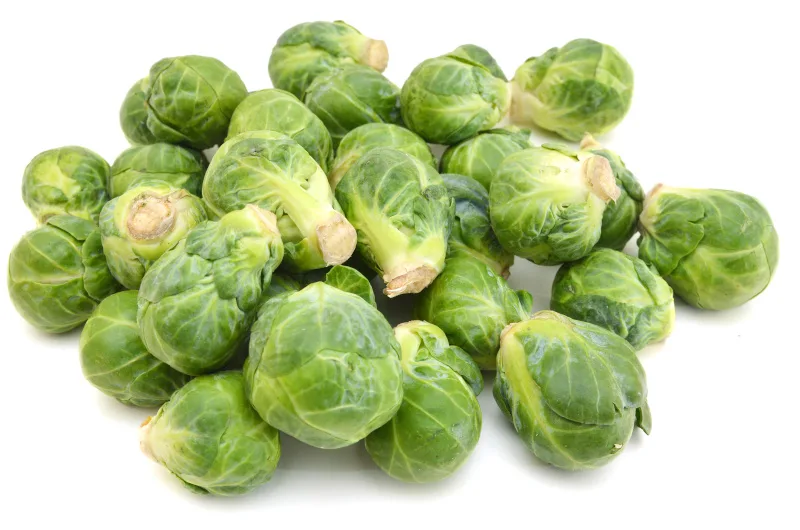How To Grow Brussels Sprouts
Brussels sprouts, those petite green gems often found adorning festive dinner tables on Christmas Day, are not only delicious but also packed with essential nutrients. Love them or hate them, these miniature cabbages have earned their place as a staple in many British gardens due to their versatility in cooking and impressive health benefits.
Selecting the Right Variety:
Choosing the right variety of Brussels sprouts is the first step towards a bountiful harvest. In the UK, varieties like ‘Evesham Special’ and ‘Bosworth’ are well-suited to the climate and soil conditions. These varieties are known for their reliable yields and excellent flavour.
Preparing the Soil:
Brussels sprouts are brassicas (cabbage family) and thrive in well-draining, fertile soil. Before planting, ensure the soil is enriched with organic matter, such as compost or well-rotted manure. This not only improves soil structure but also provides the necessary nutrients for healthy plant growth. Brassicas generally prefer neutral to slightly alkaline soil (pH 7.0 or above). If your soil is more acidic, add lime when transplanting.
When To Sow Brussels Sprout Seeds:
Start by sowing Brussels sprout seeds indoors during late winter or early spring. There are many different varieties of brussels sprouts, each with differing growing seasons, but most are typically sowed around February to March. Plant the seeds in trays or small pots, using a good quality seed compost. Keep the seeds moist and place them in a warm, well-lit location to encourage germination. Once the seedlings develop their first true leaves, they can be transplanted to larger pots before moving them to the garden.
Transplanting and Spacing Young Plants:
Transplant the young Brussels sprout seedlings outdoors in their final position in late spring or early summer, when the risk of frost has passed. Space the plants about 60-75cm (24-30 inches) apart, allowing enough room for them to develop and spread. All brassicas like to grow in firm soil, so it’s a good idea to tread the soil down firmly in each planting spot, then dig a hole with a trowel and plant the seedlings, firming in well, but taking care not to damage the roots. Brussels sprouts can be prone to club root, so if it’s a known issue in your local area, add a good sprinkle of lime to the bottom of each planting hole, as this adds calcium ions and reduces acidity, helping to make the plants more resistant to disease.
Caring for Brussels Sprouts:
Watering: Keep the soil consistently moist, especially during dry spells. Water deeply and evenly to encourage strong root development. Avoid overwatering, as waterlogged soil can lead to root rot.
Mulching: Apply a layer of organic mulch around the base of the plants to help retain moisture, suppress weeds, and maintain a consistent soil temperature. Garden compost is a good option.
Feeding: Brussels sprouts are heavy feeders. Fertilise them every few weeks with a balanced, slow-release fertiliser or a liquid feed rich in potassium and phosphorus.
Supporting: A lot of varieties can produce tall plants so, as the plants grow taller, they may require staking to prevent them from toppling over under the weight of the developing sprouts or damage from wind rock.
Pest and Disease Management:
Brussels sprouts can be susceptible to pests like aphids, caterpillars, and cabbage root fly. Regularly inspect your plants for signs of infestation and take appropriate measures, such as using natural predators or approved pesticides, if necessary. Pigeons also love to nibble young leaves from all brassica plants, so it’s worth netting if growing on an allotment or other exposed area.
Harvesting:
Harvesting typically begins in late autumn and extends through the winter months. Begin by picking the lower sprouts first, working your way upward along the stem. The sprouts should be firm, bright green, and about the size of a walnut. Remove the sprouts by twisting them gently, leaving the upper leaves and growing tip intact to encourage further growth.
Enjoying the Fruits of Your Labour:
Homegrown Brussels sprouts are a true delight, offering a superior taste and freshness compared to store-bought options. Their rich nutritional profile, including vitamins C and K, fibre, folic acid and antioxidants, make them a valuable addition to your diet. Whether served steamed, roasted, or incorporated into hearty dishes, your homegrown Brussels sprouts are sure to be bursting with flavour and full of nutrients. It’s well worth investigating a few Brussels sprout recipes, as they’re a versatile crop, with far creative options than just simple boiling or steaming. You can even use them to create Brussels sprout Sauerkraut. Just don’t forget to leave a few for harvesting Christmas Eve, so you can experience the freshest, tastiest sprouts on Christmas Day!



